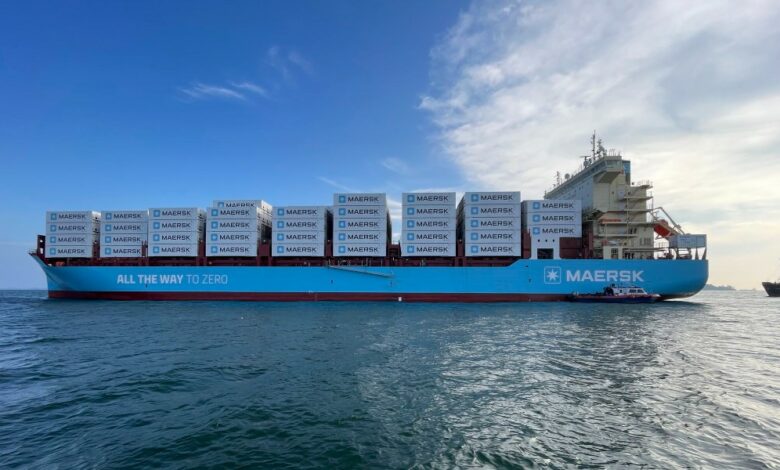Two cheers for Mr Moller

Ahead of a landmark boxship naming ceremony today in Copenhagen, Andrew Craig-Bennett wishes there were more Maersks sailing the seven seas.
Maersk is being as good as its word; it is going to use ‘green’ methanol to fuel its new Baltic feeder vessel which will be named today in Copenhagen. See Adis Adjin’s report here in Splash from the 8th of this month. Only two cheers, because whilst it is leading the rest of the shipowners of the world in the right direction, it does have a few other ships. So, one cheer for leading in the right direction (cynics will say “…but of course she is for their Baltic trade!”… but she has been built and she will use green methanol)… and another cheer for getting stuck into the ghastly complexity of actually buying and taking delivery of ‘green’ fuel and engaging in a sensible discussion of what green fuel actually means in a shipping context and trying to get the great hydrocarbon supply companies to take the subject seriously.
You will have read Bojan Lepic’s article on the 7th here in Splash which points out the remarkable fact that in order to ‘decarbonise’ by changing to green fuel the merchant shipping industry will have to buy and use an awful lot of the green fuel made by the whole planet. Quoting DNV: “To meet the anticipated demand of 17m tonnes of oil equivalent annually by 2030, the maritime sector needs to access a staggering 30-40% of the projected worldwide carbon-neutral fuel supply.”
You will be thinking that 2030 is seven years away, and that common sense tells us that this is not going to happen. The shipowners of the world have woken up a bit, but nowhere near enough. Almost all the slightly greener ships on order are ‘dual fuel’. Dual fuel is not good enough, and what is worse is that the pie charts in Bojan’s report show that almost half the ships on order are intended to burn nasty brown heavy fuel oil and nothing else. Their owners are not even making the token gesture of arranging their ships for dual fuel and in a lot of these dual fuel ships the token gesture amounts to building in, not the tanks for the much spoken of green fuel, but the footings for the tanks.
For every Maersk there will be 20 owners thinking about how to dodge the new regulations
Maersk is to be commended because behind this ship it has another 20 green methanol burners planned and on order. It is doing the right thing and is showing up everyone else.
But for every Maersk there will be 20 owners thinking about how to dodge the new regulations once the regulations are promulgated.
Our industry is starting to get there, but as the UN climate report published on the 9th says about all the planet’s collective efforts, it’s too little and too late. We are at 1.1 degrees of warming now and we will get to 2.6 degrees for certain.
As DNV says, changing to green fuels does not get us to where we need to get to, and to make the point that everyone keeps tiptoeing round, the cost of green fuels is going to be staggering.
DNV touches on wind assistance and on air lubrication – both techniques that have been around for decades without exactly inspiring people; their reliability is questionable and their contribution to cutting out greenhouse gas emissions is limited to a few single figures of percentage points. The Flettner rotor is a century old, and physics doesn’t change. We are going to need some better thinking on this subject.
What we can do is thank Maersk for getting stuck in and trying to run a ship – maybe several ships – on green fuel.
This isn’t going to be easy, and hiding under the desk won’t help.

Is methanol really a green fuel. It has some nasty toxic properties and it will be interesting to see how any accidental spillage or leakages are contained.
The source to engine to stack economics need to be much more transparent.
The criticism of other owners remaining with existing fuels might be seen as a sensible contingency. given the noise about options to convert existing power plants to greener alternatives (if proven)
Compared to the alternatives, yes. Obviously. Is it the ultimate answer? Probably not, but why carry on polluting at the rate we have been when we can drastically reduce it.
I fisrt new Maersk as the owner of crude oil tankers, so they have come a long way.
knew!